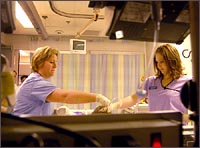
Part One: The Longest Running Nursing Shortage in History
Click here to listen to Part 1 in Real Audio
There have been shortages of nurses in this country since the 1960's but they have always resolved themselves fairly quickly. This nursing shortage, which began in 1998, not only persists but is expected to get a lot worse.
 |
|
| Nurse MJ Pender in the Surgical Intensive Care Unit with
nurse graduate
Allison Smith. (Photo: Chiya Louie) Click here to see more photos of nurses featured in this documenary. |
|
As hospitals started experiencing acute shortages of nurses, they responded by raising salaries and offering bonuses to nurses to enter the profession. Media campaigns were launched to extol the attractions of nursing. By 2003 185 thousand registered nurses entered this nation's hospital workforce. But even with this huge influx of nurses the shortage in 2007 is still here, and as demand for nurses increases many agree the gap will steadily grow.
.